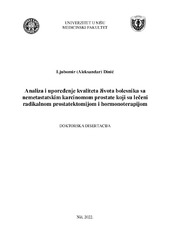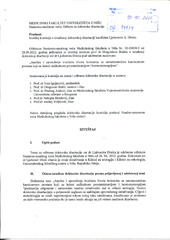Приказ основних података о дисертацији
Analiza i upoređenje kvaliteta života bolesnika sa nemetastatskim karcinomom prostate koji su lečeni radikalnom prostatektomijom i hormonoterapijom
| dc.contributor.advisor | Bašić, Dragoslav | |
| dc.contributor.other | Ignjatović, Ivan | |
| dc.contributor.other | Aleksić, Predrag | |
| dc.contributor.other | Đorđević, Nebojša | |
| dc.contributor.other | Veljković, Andrej | |
| dc.creator | Dinić, Ljubomir | |
| dc.date.accessioned | 2023-09-06T14:48:38Z | |
| dc.date.available | 2023-09-06T14:48:38Z | |
| dc.date.issued | 2022 | |
| dc.identifier.uri | http://eteze.ni.ac.rs/application/showtheses?thesesId=8604 | |
| dc.identifier.uri | https://fedorani.ni.ac.rs/fedora/get/o:1891/bdef:Content/download | |
| dc.identifier.uri | https://plus.cobiss.net/cobiss/sr/sr/bib/112701193 | |
| dc.identifier.uri | https://nardus.mpn.gov.rs/handle/123456789/21705 | |
| dc.description.abstract | The aim of the study was to evaluate health-related quality of life in patients with non-metastatic prostate cancer. The patients were divided in two groups. The first group consisted of patients who underwent RRP, and the second group consisted of those who were primarily treated with hormonal therapy for 12 months and then underwent external radiation therapy (H + Z). The (EPIC) questionnaire was used to evaluate healthrelated quality of life (HRQoL), the (IIEF-SF) questionnaire was used to assess erectile function, the (ICIQ-UI) questionnaire was used to assess urinary incontinence, and IPSS questionnaire was used to assess lower urinary tract symptoms. All patients filled out questionnaires before the start of treatment, in the 3rd, 6th, 12th, 15th, 18th and 24th months of followup. At 12-month follow-up compared to baseline, the greatest decrease in mean IIEF score (p < 0.05), the greatest increase in mean ICIQ-UI score (p < 0.01), the greatest decrease in the mean IPSS score (p < 0.001), and the greatest decrease in IPSS QoL score (p < 0.001) was in RRP group. For HRQoL, according to the EPIC results, urinary function, urinary incontinence and sexual function significantly decreased compared to baseline after 12 months (p < 0.05 for all) in RRP group, and hormonal function, sexual function and sexual bother (p < 0.001 for all) in the (H + Z) group. From 12th to 24th months in the RRP group, there were no changes in the mean IIEF, ICIQ-UI, IPSS, IPSS QoL scores compared to the 12th month, nor in the HRQoL results. In the H + Z group, a significant decrease in the IIEF score, a decrease in sexual function and sexual bother, and an increase in hormonal function were verified. From a HRQoL perspective, both treatment modalities can offer satisfactory functional outcomes. RRP has the greatest impact on urinary and sexual function, hormonal therapy on sexual and hormonal function, and H + Z on sexual function and sexual bother. | en |
| dc.format | application/pdf | |
| dc.language | sr | |
| dc.publisher | Универзитет у Нишу, Медицински факултет | sr |
| dc.rights | openAccess | en |
| dc.rights.uri | https://creativecommons.org/licenses/by-nc-nd/4.0/ | |
| dc.source | Универзитет у Нишу | sr |
| dc.subject | karcinom prostate | sr |
| dc.subject | prostate cancer | en |
| dc.subject | radical prostatectomy | en |
| dc.subject | hormone therapy | en |
| dc.subject | quality of life | en |
| dc.subject | radikalna prostatektomija | sr |
| dc.subject | hormono terapija | sr |
| dc.subject | kvalitet života | sr |
| dc.title | Analiza i upoređenje kvaliteta života bolesnika sa nemetastatskim karcinomom prostate koji su lečeni radikalnom prostatektomijom i hormonoterapijom | sr |
| dc.type | doctoralThesis | |
| dc.rights.license | BY-NC-ND | |
| dc.identifier.fulltext | http://nardus.mpn.gov.rs/bitstream/id/151950/Disertacija.pdf | |
| dc.identifier.fulltext | http://nardus.mpn.gov.rs/bitstream/id/155709/Dinic_Ljubomir_A.pdf | |
| dc.identifier.rcub | https://hdl.handle.net/21.15107/rcub_nardus_21705 |



